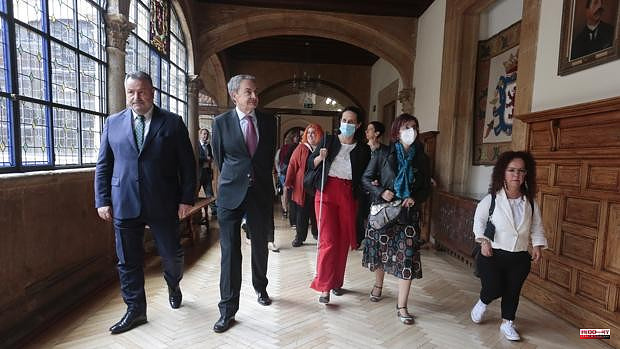"Sometimes we lose our lives discussing the color of a flag and what we have to try is to dedicate a life so that there is not a single woman who suffers discrimination that prevents her from living with a minimum of dignity," said the former President of the Government José Luis Rodríguez Zapatero, who has asked the provincial councils to "increase sensitivity in favor of women with disabilities", considering it "the most noble task that a country can do".
Zapatero, who has visited the Diputación de León on the occasion of the celebration of the XIX Ordinary Meeting of the women of the Spanish Committee of Representatives of Persons with Disabilities, has recalled that for six years he has been part of the board of Cermi Mujeres, which It has made it possible to "learn many things" thanks to the fact that "they carry out an exemplary social task" for the hundreds of thousands of women with disabilities who "face problems of all kinds in life".
Among these problems, the former president has highlighted "the difficulty of access to education and work", since according to the figures, unemployment for this group exceeds 70 percent. To this is added an "extraordinarily sensitive" issue, such as the fact that "half of women with disabilities suffer some type of abuse of gender violence."
The president of the provincial institution, Eduardo Morán, has picked up the gauntlet launched by Zapatero and has promised to convey to all the provincial councils in Spain, through the Provincial Commission, the work carried out by Cermi and its concerns. Likewise, Morán has advanced that the Diputación de León will prepare, together with Cermi, a census of women and girls with disabilities in the province to "have real data and be able to work on improving their situation" and that "they can enjoy with normality of a life with its rights in a democratic country and so advanced in social rights that it still has some gaps».
For her part, the president of the Cermi Mujeres Foundation, Marta Valencia, explained that her work, "in addition to raising awareness in society and working with professionals", aims to "support organizations for women with disabilities so that they work with they".
Within the normative work of the Foundation, its president alluded to "a very important point", such as the elimination of forced sterilization at the end of last year, although now she hopes that "it will go from legislation to being a reality". Similarly, she has detailed that legislation for sexual freedom is in process, so that forced sterilization is recognized as a sexual crime and the women victims "have psychological and economic compensation."
Zapatero has also accompanied the committee during the reception of the León City Council. The mayor of the Leonese capital, José Antonio Diez, has highlighted the commitment to "labour and educational integration, the elimination of architectural barriers and research".
The headquarters of the Leonese Consistory, in the Plaza de San Marcelo, hosts from today the photographic exhibition 'The impact of the pandemic on institutionalized older women with disabilities', of the Cermi Mujeres Foundation, with which it is intended to "bring to light a unknown reality and include on the agenda the demand for a public policy, centered on people, where residential and care alternatives do not go through ostracism and segregation", so that "the right to live independently and to be included in the community is a reality for thousands of older women with disabilities around the world."












